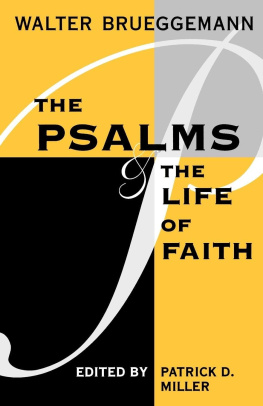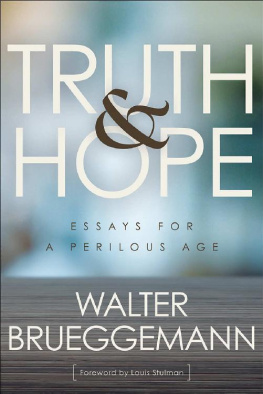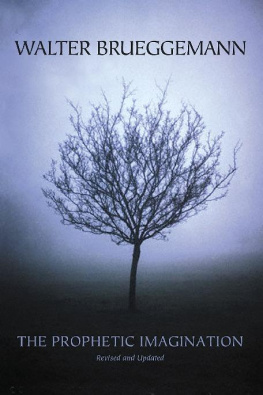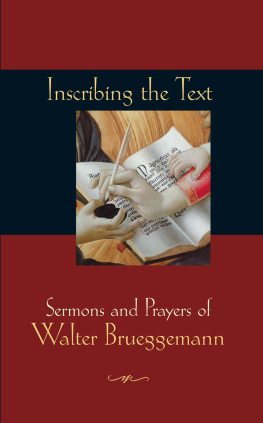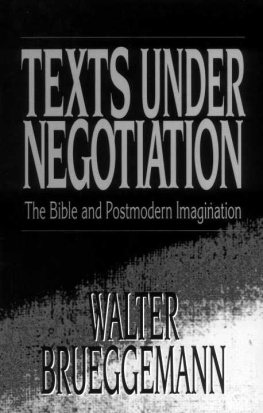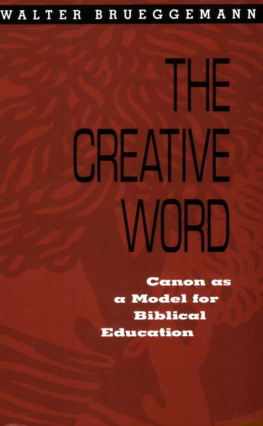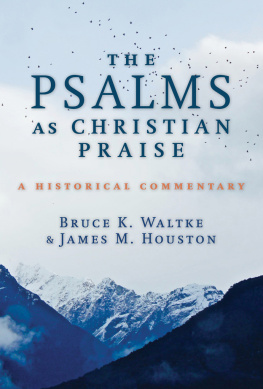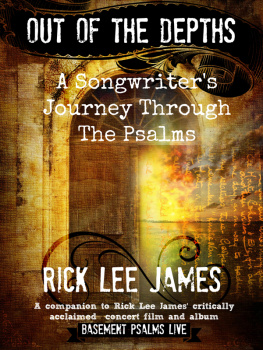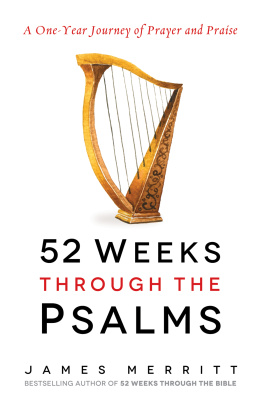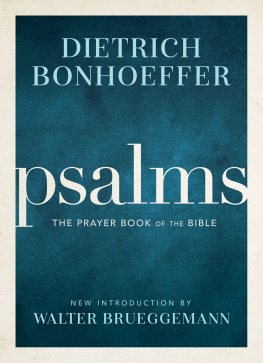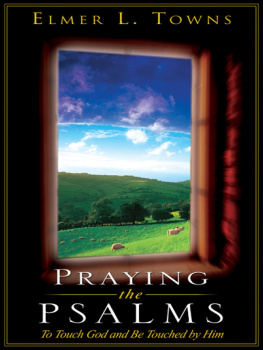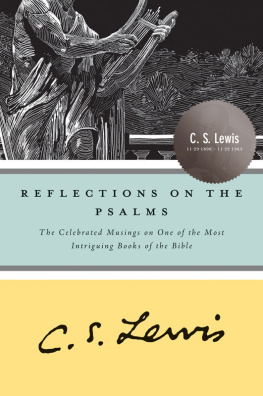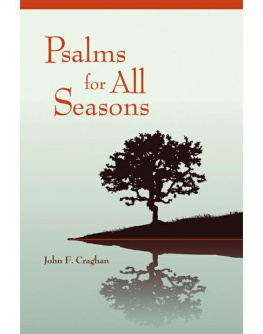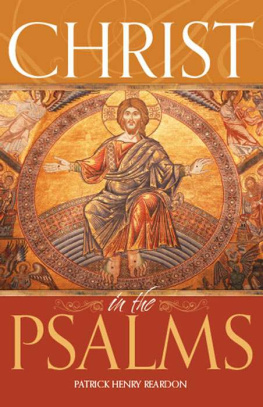Walter Brueggemann - Psalms and Life of Faith
Here you can read online Walter Brueggemann - Psalms and Life of Faith full text of the book (entire story) in english for free. Download pdf and epub, get meaning, cover and reviews about this ebook. year: 1995, publisher: Augsburg Fortress Publishing, genre: Religion. Description of the work, (preface) as well as reviews are available. Best literature library LitArk.com created for fans of good reading and offers a wide selection of genres:
Romance novel
Science fiction
Adventure
Detective
Science
History
Home and family
Prose
Art
Politics
Computer
Non-fiction
Religion
Business
Children
Humor
Choose a favorite category and find really read worthwhile books. Enjoy immersion in the world of imagination, feel the emotions of the characters or learn something new for yourself, make an fascinating discovery.
- Book:Psalms and Life of Faith
- Author:
- Publisher:Augsburg Fortress Publishing
- Genre:
- Year:1995
- Rating:4 / 5
- Favourites:Add to favourites
- Your mark:
- 80
- 1
- 2
- 3
- 4
- 5
Psalms and Life of Faith: summary, description and annotation
We offer to read an annotation, description, summary or preface (depends on what the author of the book "Psalms and Life of Faith" wrote himself). If you haven't found the necessary information about the book — write in the comments, we will try to find it.
Psalms and Life of Faith — read online for free the complete book (whole text) full work
Below is the text of the book, divided by pages. System saving the place of the last page read, allows you to conveniently read the book "Psalms and Life of Faith" online for free, without having to search again every time where you left off. Put a bookmark, and you can go to the page where you finished reading at any time.
Font size:
Interval:
Bookmark:
The Psalms and
the Life of Faith
FORTRESS PRESS BOOKS
BY WALTER BRUEGGEMANN
The Land- Place as Gift, Promise, and Challenge in the Biblical Faith (1977)The Prophetic Imagination (1978)The Creative Word: Canon as a Model for Biblical Education (1982)David's Truth in Israel's Imagination and Memory (1985)Hopeful Imagination: Prophetic Voices in Exile (1986)Israel's Praise: Doxology against Idolatry and Ideology (1988)Finally Comes the Poet: Daring Speech for Proclamation (1989)Interpretation and Obedience: From Faithful Reading to Faithful Living (1991)Old Testament Theology: Essays on Structure, Theme, and Text (1992)Texts under Negotiation: The Bible and Postmodern Imagination (1993)A Social Reading of the Old Testament: Prophetic Approaches to Israel's Communal Life (1994)The Psalms and the Life of Faith (1995)The Threat of Life: Sermons on Pain, Power, and Weakness (1996)The Psalms and
the Life of Faith
Contents
Vii
ix
xi
Part One
The Psalms as Prayer and Praise
Part Two
Covenant and Canon as Context
Part Three
Interpreted Psalms
Acknowledgments
WITH THE PUBLICATION OF THIS VOLUME, Patrick Miller has now completed the editing of three volumes of my journal articles. He had proposed exactly three volumes on (1) biblical theology, (2) prophetic faith, and (3) the Psalms. This triad of themes is now completed with this volume, following Old Testament Theology: Essays in Structure, Theme, and Text (1992) and A Social Reading of the Old Testament: Prophetic Approaches to Israel's Communal Life (1994).The appearance of this volume provides an appropriate occasion for me to express my gratitude to Patrick Miller, without whom these volumes would never have appeared. I can identify three aspects of his work with these materials that leave me greatly indebted to him. First, the whole project was his idea, for I would never have had the presence or nerve to imagine such a reprinting. Second, he has worked imaginatively in his introductions to the volumes and the ordering of the several articles to suggest a layer of intentionality and coherence to my articles, a coherence I would never have had the wits or courage to suggest. Third, he has done the careful and meticulous work of editing, discerningly making changes that have invariably produced improvement. It is an extraordinary gift to me to have Miller interrupt his own important research and writing in order to make these volumes possible.In his introduction, Miller has noted my hurried, ad hoc way of working and has managed to be positive about it. All the more I am aware of his contrasting ways of working, which are marked by patience, comprehensiveness, and judiciousness, all of which he has placed at my service. I am indeed fortunate to have him as a friend and colleague, for he regularly turns my inchoate efforts to advantage. (It probably does not hurt either to have him as my kinsman.)I express, as well, four other appreciations. Marshall Johnson, Director of Fortress Press, has been fully supportive of this three-time effort. David Lott has been the Fortress editor for these volumes and has brought them to well-being in endlessly helpful ways. Tempie Alexander, seemingly incapable of impatience or ill-temper, has in her usual deft way managed endless retyping and sorting out old versions and new disks. Finally, Mary Miller Brueggemann has with attentiveness lived through my varying moods of hope and doubt and has practiced the kind of steadfastness that supports my writing efforts.It is a daring thing to republish. Likely Johnson, Lott, Miller, and even Mary feel mainly relief at it all coming to fruition. My own counterpoint is deep appreciation that my work over time has received the kind of affirmative support to make it credible for me to continue my somewhat off-centered reading of texts. The community of my readers thus finally has been the source of permission for this consolidation, and that is my other deep gratitude.WALTER BRUEGGEMANNAbbreviations
Introduction
Patrick D. Miller
WITHOUT HAVING WRITTEN a commentary on the Psalms, Walter Brueggemann has done more to influence the interpretation and "use" of the Psalms than any other American scholar of his generation. That is evident in two ways. His small study of the Psalms, titled The Message of the Psalms, together with his various essays-some of which are reprinted here-have been used widely among pastors and preachers in their homiletical, liturgical, and pastoral appropriation of the Psalms. Many ministers and priests have pointed to Brueggemann's The Message of the Psalms as among the most helpful resources for the pastoral role of the Psalms. While it is not a commentary per se, it is used frequently in that manner when pastors are preaching on the Psalms or engaging them in the context of pastoral care.Brueggemann's influence, however, is not confined to the ministerial and ecclesiastical study and use of the Psalms. Hermann Gunkel's classic categorizing of the Psalms into form-critical genres has so carried the day that, until fairly recently, there has been hardly a commentary on the Psalms or an introduction to the Psalter that has not taken its orientation from Gunkel's classification of the Psalms into individual and communal laments, hymns and songs of thanksgiving, royal and wisdom psalms, together with several other less frequent genres. Indeed, many works on the Psalms are organized around these categories. It has only been with Brueggemann's seminal article, "Psalms and the Life of Faith: A Suggested Typology of Function," which is the lead essay in this volume, that we have had a significant alternative to Gunkel's categories, one that has been taken up not only by pastors but by one of the major contemporary introductions to the Old Testament, Norman Gottwald's The Hebrew Bible.It would be a misreading to set Brueggemann's division of many of the psalms into songs of orientation, disorientation, and reorientation over against the genres that Gunkel identified. Brueggemann's work is greatly indebted to and-like all contemporary Psalms scholarship-builds upon Gunkel. The significant difference is to be found in the title of the defining essay, that is, in the concern for "function" and the focus on "the life of faith." Indeed, it is precisely the function of the psalms in the life of faith that is Brueggemann's concern and the large reason why his categories are so amenable to the reading and interpretation of the psalms in the community of faith.This does not mean that Brueggemann is inattentive to possible cultic and social settings. On the contrary, the social context in which psalms were-and are-prayed and sung is a matter of constant attention in this volume (see below). What Brueggemann seeks to do, however, and this is especially apparent methodologically in the first essay, is join the exegesis of the text with the hermeneutics of its appropriation. Hermeneutics is not something that is tended to once the form-critical issues are settled or have their voice. It is a dimension of the category definition itself. The starting point of the methodological and more expository essays of this volume is the assumption that "modern and ancient use of the Psalms share a common intent and function even though other matters such as setting and institution may be different."The extent to which the analysis of the Psalms in these essays is more hermeneutical than form-critical-though Brueggemann has read and draws frequently upon all the standard form-critical workis reflected to no small degree in the fact that the seminal figure in the first and programmatic essay is Paul Ricoeur. Brueggemann does not simply take over an interpretation theory from Ricoeur and apply it like a grid to the Psalms. Ricoeur functions for him in a heuristic fashion, providing some fundamental categories for thinking about how the human experience is reflected in the language of the psalms. Ricoeur's hermeneutic of suspicion and retrieval, or the dialectic of displacement and recapture, is imaginatively transformed into a way of depicting the movement from prayer to song, from lament to praise. That movement is a reflection of the dialec tic of human existence. (To that extent, Brueggemann is indebted also to Claus Westermann, though the latter is less interested in exploring the various human experiences and contexts-particularly the social contexts-in which this dialectic operates.) The powerful significance of language and its capacity to provide symbolization systems, to evoke interpretive worlds, are also features of Ricoeur's thought that are drawn into the interpretation of the Psalms in this context.The joining of more traditional form-critical study of the Psalms with hermeneutical and pastoral concerns is manifest in all of the essays in Part One of this volume. The second chapter, "The Psalms as Prayer," is a minitheology of the Psalms, minus any particular focus on the king, a feature of the Psalms that receives little attention in this volume but is more to the fore in one of Brueggemann's other studies of the Psalms, Israel's Praise. Here are sounded basic themes that are lifted up and elaborated in the essays that follow:the dialogic character of the psalms (see chaps. 3, 4, 5);the impossible wonders of God's activity that overturn conventional ways of thinking and acting (see chap. 9);the steadfast love and faithfulness of God as a manifestation of costly solidarity (see chaps. 8, 14);praise as an act of basic trust and abandonment (see chaps. 6, 8, 10);the centrality of issues of justice and injustice in the dialogue of the Psalms (see chaps. 5, 11, 14);the sociological realism of Israel's prayer and praise (see chaps. 11, 12, 14).The rest of the chapters in Part One then turn to a more extended elaboration of the two poles of psalmic theology: lament and praise. The exploration of the lament under the title "From Hurt to Joy, from Death to Life" (chap. 3) demonstrates that this aspect of human existence, which Brueggemann now treats under the rubric "songs of disorientation," is not something confined to the Psalms alone. Starting with the psalms of lament/disorientation, Brueggemann moves out into the broader ranges of the Old Testament to show how thoroughly the lament/deliverance experience was a constitutive part of Israel's life, a clue to why it can be claimed to be fundamental to human life generally. In this chapter, written relatively early in Brueggemann's career, he works out of the classic form-critical analysis of the lament. The programmatic first chapter is his fresh adaptation of that analysis into a new typology.That we are talking about something "formative" that transcends a particular genre of biblical literature is further underscored in Brueggemann's comparison and contrast of the form of the lament with the human experience of death and dying as that has been analyzed by Elizabeth Kubler--Ross into successive stages involving denial, anger, bargaining, depression, and acceptance (chap. 4). Brueggemann does not see an easy correlation. Indeed, he argues that Israel's "form" of lamenting has some important things to say to the contemporary experience of facing death or death experiences. But his sense of the "formfulness" of our modes of dealing with disaster and crisis, death and near-death, is an anticipation of the ground-breaking work of the first chapter (written at a later time).The last of the essays that deals specifically with the character of lament-"The Costly Loss of Lament" (chap. 5)-reflects three of Brueggemann's continuing emphases: the psychological dimension of lament; its sociological aspect; and the dangers and losses we incur when the voice and language of lament are suppressed. Here, as elsewhere in these essays (e.g., chap. 6), the psychological partner is the theory of personality development called "object-relations theory," a perspective that sees external relationships with others as crucial for the development of the child. Brueggemann uses the theory heuristically to argue the necessity of lament as an initiative from the believer toward God. The sociological dimension of lament is encountered in the way in which the lament psalms "raise and legitimate questions of justice in terms of social goods, social access, and social power." While the "loss" that Brueggemann worries about in this essay is particularly in terms of these psychological and sociological dimensions, in other contexts he protests the loss of lament in the liturgical and pastoral spheres, While he does not always say so, it is such ego and justice issues as he describes in this chapter that he fears are not fully uncovered and voiced by individuals and the community when the sounds of lament are stilled.While Brueggemann's primary focus in these essays is on the lament prayers of the Psalter (what he calls songs of disorientation), his typology does not ignore the hymns of praise and songs of thanksgiving-songs of orientation and reorientation (or new orientation) in his typology. The theological, ecclesiastical, and social significance of praise is developed in chapter 6, "Praise and the Psalms: A Politics of Glad Abandonment." What will be of particular interest to the reader is the way in which some of the catchwords of Brueggemann's ongoing theological and hermeneutical enterprise are interpretive clues to what he sees happening in praise. Anyone familiar with his work will not be surprised to hear him speak about "doxological, polemical, political, subversive, evangelical faith." These are all catchwords in Brueggemann's theology. What this chapter uncovers is how, quite precisely, such faith is enacted in the church's praise. Further, an important dialectic is perceived in the praise of the community of faith, one that Brueggemann insists, in other contexts, is intrinsic to biblical faith. The dialectic is marked in two ways. Praise is at one and the same time an act of audacity and an act of basic trust. Such basic trust is itself dialectical as it involves both self-assertion and self-abandonment. How that can be the case, the reader will discover in these pages. Here, also, one will encounter a theological claim that surfaces elsewhere at various points, to wit, that human prayer and praise work on God. They force God's hand. Brueggemann, in this way, has his own twist on the current and popular theme of the vulnerability of God.Part Two of this book is less specifically oriented around the Psalms. But all of these chapters bear on dimensions of prayer and praise, on the Psalms and their echoes elsewhere in Scripture. In several of these essays, Brueggemann lifts up a matter of high importance to him and one that has been present in the previous volumes of his collected essays. It is the covenantal structure of biblical faith. Little bothered by the debates about the form and dating of covenant-though he is thoroughly conversant with them and draws eclectically on the discussion without taking a firm position on one side or the other-Brueggemann insists that "in the Old Testament, relationship to God is best understood under the notion of covenant," in which both parties not only bind themselves to one another but in so doing accept both the possibility of risk in the actions of the other party and the necessity of some control or governance by the other member of the covenant, a sharing of both risk and power.In the chapter titled "Prayer as an Act of Daring Dance" (chap. 7), Brueggemann explores this risky and shaping relationship of covenant through some of the prayers of Scripture outside the Psalter. Once more, the reader will see Brueggemann's heuristic and fruitful use of contemporary psychological theory as he draws upon Murray Bowen's construct of "triangling" to describe the dy namics at work in these prose prayers. (Elsewhere, he brings the same construct into connection with Westermann's familiar identification of the three parties in the lament psalms: the self, the enemy, and God.)The title of chapter 9, "'Impossibility' and Epistemology in the Faith Tradition of Abraham and Sarah (Genesis 18:1-15)," would seem to take it outside the subject limits of this volume. It is, however, in the mind of the editor, one of the most valuable of all these essays. The chapter is the most extended development of one of the primary themes of Brueggemann's work. While the subject matter is not a psalm or a prayer text, the narrative of Abraham and Sarah initiates "a radical trajectory" that permeates the whole of Scripture, Old and New Testament alike. This trajectory is the claim that "con ventional definitions of reality do not contain or define what God will yet do in Israel." More specifically, the essay is a study of the word pela' (and related words), traditionally translated as "wonder" or "marvel" but which Brueggemann dubs, in a happy bit of personal translation, "impossibility." The connection to the Psalms is in the essay's exploration of what he calls "songs of impossibility," those psalms and biblical songs that speak of "God's impossibilities that shatter every contained view of reality." The epistemological point here is one of the recurring items on Brueggemann's agenda. His appropriation of postmodern themes is not simply a matter of being au courant with latest trends of thought-which indeed he always is by virtue of his voracious reading habits-but is fed by his own sense that Scripture frequently challenges our assumptions about the way we know and what we can claim. As he takes the theme of "God's impossibilities" into the New Testament and the Christ-event this chapter becomes a small jewel of biblical theology, climaxed by the amazing way in which, at the end of the essay, he draws Karl Barth and Mircea Eliade into theological partnership.The final chapter in Part Two brings Brueggemann back into the center of the most current aspects of psalms study, the effort to see the Psalter as a whole as a subject of interpretation, to ask about the hermeneutics of the collection and shape of the Psalter, what it means to read psalms in their literary context, in relation to the psalms around them. This is an example of the wider concern of biblical scholarship to focus on the final form of the text as the primary subject of interpretation. While most such discussions have focused on particular or smaller groupings of psalms, Brueggemann wades into the discussion with a proposal about the meaning of the present shape of the whole Psalter-an ambitious feat, to say the least. The main point is in the title, the movement from the obedience of Psalm 1 to the praise of Psalm 150. But the reader familiar with Brueggemann's work will know immediately that things are not that simple, and indeed they are not. For he seeks to show that between those bounds there is a drama of faith and life, of suffering and hope, reflected in the plunge from Psalm 1 into the middle of the Psalter and its world of "enraged suffering" (e.g., Psalm 25) on the way to the "steadfast love" of God (e.g., Psalm 103) that can deliver from the suffering. The most important contribution of the study may be his focus upon Psalm 73 as the lynchpin in the move from Psalm 25 to Psalm 103, from Psalm 1 to Psalm 150. His ultimate claim is quite important. It is thatthe shape of the Psalter correlates with the shape of Israel's life with God. At the boundaries of that life, as at the boundaries of the Psalter, are obedience as the premise and praise as the culmination. One must, however, go inside life, and there one will find candor [Psalm 25], communion [Psalm 73], and gratitude [Psalm 103].While none of the above essays is without significant focus upon particular texts and the way in which their details contribute to a larger theological picture, the chapters that comprise Part Three are a collection of quite specific and full interpretations of particular psalms. They are not the typical psalms that one finds in the handbooks of psalms exposition and interpretation. Nor is their interpretation typical exposition. The psalms taken up here are either less familiar than many other psalms or more problematic-or both.Brueggemann's interpretations of Psalms 37 and 77 are in the same vein, attentive to the social realities that encompass and evoke a text and insistent on the significance of the "discourse" of the psalm. While speech-act theory is not to the fore in these expositions, Brueggemann is obviously sharply aware of what we have learned about the way speech effects reality and determines power. The Psalms, for him, are not simply ancient texts or routinized elements of a liturgy. As they come to speech, as they are read, they make claims about reality, indeed shape reality in ways more potent and shocking than we usually realize. Brueggemann's great contribution is to uncover the power, literally, of these psalms and to awaken us to what is said and done in singing and praying them.Next pageFont size:
Interval:
Bookmark:
Similar books «Psalms and Life of Faith»
Look at similar books to Psalms and Life of Faith. We have selected literature similar in name and meaning in the hope of providing readers with more options to find new, interesting, not yet read works.
Discussion, reviews of the book Psalms and Life of Faith and just readers' own opinions. Leave your comments, write what you think about the work, its meaning or the main characters. Specify what exactly you liked and what you didn't like, and why you think so.

